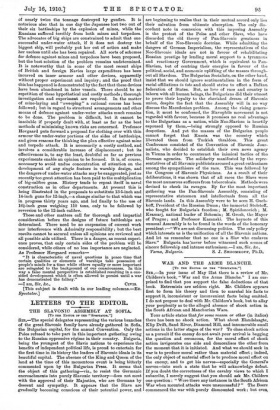LETTERS TO THE EDITOR.
THE SLAVONIC ASSEMBLY AT SOFIA..
pro THE EDITOR OP TEE "SPECTATOR."] Sne,—The special delegates representing the various branches of the great Slavonic family have already gathered in Sofia, the Bulgarian capital, for the annual Convention. Only the Poles refused to take part in this important gathering owing to the Russian oppressive regime in their country. Bulgaria, being the youngest of the Slavic nations to experience the benefits of independent political life, is proud to entertain for the first time in its history the leaders of Slavonic ideals in its beautiful capital. The absence of the King and Queen of the land at the time of this momentous event is being bitterly commented upon by the Bulgarian Press. It seems that the object of this gathering—viz., to resist the Germanic encroachments into purely Slavonic territory—does not meet with the approval of their Majesties, who are Germans by descent and sympathy. It appears that the Slays are gradually becoming conscious of their potential power, and are beginning to realise that in their mutual accord only lies their salvation from ultimate absorption. The only dis- cordant note in connexion with this imposing Assembly is the protest of the Poles and other Slays, who have discarded the old theory of Pan-Slavonic greatness in behalf of the Neo-Slavonic doctrine. While admitting the dangers of German Imperialism, the representatives of the Neo-Slavonic ideals are not in favour of rehabilitating Russian prestige by lending moral support to a tyrannous and reactionary Government, which is equivalent to Pan- Slavism, but of centring their energies in favour of the political, social, and economic uplifting of the masses through- out all Slavdom. The Bulgarian Socialists, on the other hand, insist that we should ignore sentimentalism in the form of racial affiliations in tote and should strive to effect a Balkan federation of States. But, as love of race and country is inborn with all human beings, the Bulgarians did their utmost to prove their loyalty to the cherished dream of Slavonia union, despite the fact that the Assembly will in no way discuss the Macedonian problem. Among the rising genera- tion, it must be confessed, the Slavophile movement is not regarded with favour, because it promises no real advantage to the Bulgarians as a nation, while Neo-Slavism is heartily espoused by them,—being strongly opposed to Russian despotism. And yet the masses of the Bulgarian people cannot forget that Russia was the country which liberated them from Turkish thraldom. This great Conference consisted of the Convention of Slavonic Jour- nalists, who decided to establish their own news agency in Vienna in order to counteract the inimical tactics of the German agencies. The solidarity manifested by the repre- sentatives of all Slavonic publicists aroused a great enthusiasm among the sympathisers of the race. This was followed by the Congress of Slavonic Physicians. As a result of their deliberations, it was shown that of all races the Slays were the most numerous sufferers from tuberculosis. Methods were devised to check its ravages. By far the most important gathering was the Pan-Slavonic Assembly, consisting of representative statesmen and intellectuals from all the Slavonic lands. In this Assembly were to be seen M. Ouch- koff, President of the Russian Duma ; the immortal Stoletoff, who fought for Bulgaria's freedom ; M. Spiridonovich ; M. Kramarj, national leader of Bohemia ; M. Grosh, the Mayor of Prague ; and Professor Kazanski. The keynote of this unusual Assembly is to be found in the words of the honorary president :—" We are not discussing politics. The only policy which interests us is the unification of all the Slavonic nations. And let us remember that no one is a Slav who enslaves Slays." Bulgaria has :never before witnessed such scenes of sincere fellowship and intense enthusiasm.—I am, Sir, &c.,






































 Previous page
Previous page